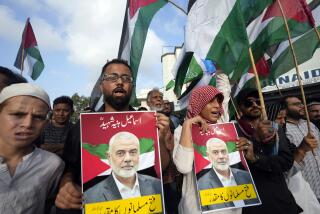News of slaying elicits outrage, concern abroad
- Share via
UNITED NATIONS — World leaders expressed outrage Thursday over the assassination of Pakistani opposition leader Benazir Bhutto and concern about the stability of the nuclear-armed nation.
Leaders of countries that share borders with Pakistan also shared worries about whether the attack might spark regional unrest.
In India, Pakistan’s neighbor and longtime rival, Prime Minister Manmohan Singh said he was “shocked and horrified to hear of the heinous assassination.” He termed Bhutto, who had tried to improve relations between the countries, “irreplaceable,” and said that “in her death, the subcontinent has lost an outstanding leader who worked for democracy and reconciliation in her country.”
“The manner of her going is a reminder of the common dangers that our region faces from cowardly acts of terrorism, and of the need to eradicate this dangerous threat,” he said.
President Hamid Karzai of neighboring Afghanistan had met with Bhutto in Islamabad, the Pakistani capital, shortly before she was killed. Both countries are struggling with Islamic extremists who would like to return the region to fundamentalist rule with limited roles for women -- opposite the direction sought by Bhutto.
Karzai said he was “deeply pained” by the murder of “this brave sister of ours, a brave daughter of the Muslim world.”
“She sacrificed her life for the sake of Pakistan and for the sake of this region,” he said.
Iran’s Foreign Ministry spokesman Mohammed Ali Hosseini expressed sympathy to Pakistan’s government and Bhutto’s family, and called for the perpetrators to be punished.
“Continued uproar and unrest in the country is not to the benefit of the Pakistani people and would [have a] negative impact on stability and security of the regional countries,” he said.
Western leaders who had supported Bhutto’s return to Pakistan and her challenge to the military-led government urged Pakistan not to let the assassination derail democracy. National parliamentary elections are planned for Jan. 8; Bhutto was killed as she left an election rally.
In Britain, where Bhutto attended Oxford University and spent time in self-imposed exile, Prime Minister Gordon Brown said she “risked everything in her attempt to win democracy in Pakistan, and she has been assassinated by cowards who are afraid of democracy.”
President Bush, speaking at his Texas ranch, urged Pakistanis to proceed with elections to honor Bhutto’s desire for democracy.
“The United States strongly condemns this cowardly act by murderous extremists who are trying to undermine Pakistan’s democracy,” Bush told reporters at his ranch near Crawford, Texas.
In New York, the United Nations Security Council held an emergency session to condemn the assassination and to underscore the need to crack down on terrorism. U.N. Secretary-General Ban Ki-moon called the attack “an assault on stability in Pakistan and its democratic processes.”
He urged calm and unity in Pakistan.
Before going into the Security Council meeting, U.S. Ambassador Zalmay Khalilzad said he mourned the loss of a friend.
“Her death is a loss for the cause of moderation, democracy and rule of law for Pakistan. She was clearheaded about the problems of her country, the challenges that she faced -- even the security challenges she faced,” said Khalilzad, who was born in Afghanistan.
“A tribute to her memory would be lasting democracy in Pakistan -- a worthy goal for that country and all the world.”
--
More to Read
Sign up for Essential California
The most important California stories and recommendations in your inbox every morning.
You may occasionally receive promotional content from the Los Angeles Times.













